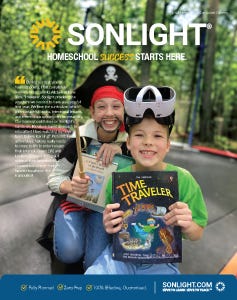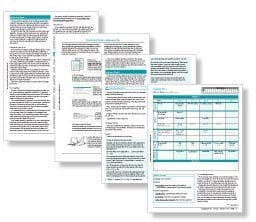We use cookies for performance, analytics and marketing. By using this site, you agree to our use of cookies. For more information, view our Cookie Notice and Privacy Policy.
Homeschooling with Excellence No. 12
Battling the Stress of Homeschooling, Part 2
Q: Kathryn was not only new to Sonlight, but she was a new homeschooler when she wrote,
I am worn out. We are working constantly: math, science, spelling. I'm just amazed at all there is to do, even without doing extra things or science experiments. My daughter is very bright and is keeping up, but there is little time to breathe, or we end up working until mid-afternoon.
We are working at such a breakneck speed. I didn't dream we would be literally panting at the end of our lessons every day. I would like to be able to actually learn parts of a sentence, do map study, but spending extra time puts the day so far behind.
I'm ready to mail it all back and do something else. Someone please share with me how to do this better.
A: Amy in Washington replied,
I am new to Sonlight this year and used to be overwhelmed too!
My son is in second grade and we are using not only the History / Bible / Literature, but math, language arts, and science too. The first two weeks I felt like crying because I just couldn't see how we would fit everything in and have time for piano lessons, art and just plain old life!
First thing I did was to put everything aside for a week and reevaluate what we really needed to get accomplished. I wanted to do it all but sometimes that is just too overbearing, so I made up a schedule to fit our daily lives which includes things like Cub Scouts, tae kwon do, Bible studies (mine), etc. I fit in chores and quiet time for myself and the boys too, plus free time. This is how I now handle all the schooling.
We start about 9 370-00 and do Bible, handwriting, math (2 pages), and a few pages from my son's reader. Then, after lunch for about another hour, we do a couple pages in his phonics book, review the spelling words, and read a few pages from either science or history/geography. I have started alternating science and history lessons. We do two weeks of each at a time.
Fridays we do only a spelling test, science experiment, piano lesson (I teach my son) and art lesson.
I plan two weeks in advance using my Instructor's Guide as a guideline. I feel so much more at peace and as I check off the things we are doing I can see the progress.
I think it's important to get the basics done, then add on with things like music, art, even science. Be patient and allow yourself time to find what works for you. Don't throw the towel in just yet! Remember, most of us have been in your shoes and found that it does get better!
A: Cinda then added,
"Don't be afraid to pick and choose. Remember, you are homeschooling, so you are in charge. You don't need to do everything in the Instructor's Guide. I suggest that you just work on what you think needs working on. If you aren't ready to teach your child cursive and she has good printing, drop the handwriting. Likewise with math, vocabulary, grammar.
Also, it is okay to not finish everything in one academic year, even if it is in the Instructor's Guide. Some people take two years for one Sonlight year.
Not every reader or read aloud has to be read for this to still be a good program.
Finally, don't forget to pray. Pray for guidance in using this curriculum. Pray that this is the right curriculum for you to be teaching your child. Pray for wisdom and patience with your homeschooling. I have been constantly amazed at some answered prayers. For us, Sonlight was an answered prayer. Remember though, it is okay if Sonlight isn't for you. Maybe another curriculum would suit you better. Also remember that you don't necessarily need everything any curriculum offers just because they sell it.
A: Melanie from Washington also had a good point when she said,
Don't forget that they pack it full with missionaries in mind who don't have soccer, piano lessons, etc. You should consider eliminating what you don't need.
Also, we do a lot of reading during meals. We read Bible lessons and work on Bible memory during breaKF1st. At lunch we do science, poetry, and history/geography reading. At dinner we do some of our read-alouds. It's also an excellent weight control method for Mom!
We also do read-alouds every day including weekends, so we usually look for extra books!!!
I know that seems hard for you to believe right now, but you'll figure out what is comfortable. Don't worry about taking a couple of days to complete something. You'll get a rhythm down pretty soon, and it will go much smoother.
I eliminated handwriting for my level-K son last year because it was too difficult for him, and he is doing just fine this year without adding handwriting.
You're the boss. The curriculum is there as a tool, not as the taskmaster.
I hope you're beginning to get the feel of what these women are saying: You're the boss. Do what's best for you. If you're new to homeschooling, start slow. It's okay. You'll get your "rhythm" soon enough. Work up to a full pace...
A: Diane in Texas (still responding to Kathryn) wrote,
Some things I'm doing with my third grader: on Mondays we don't do spelling. We do handwriting lessons Monday, Tuesday, and Wednesday, and they write and decorate their verse on Thursday. That gives me a little breathing room on Friday. We also do math only four days a week.
I don't do all the dictation or all the creative writing. I read the Bible lesson at breaKF1st, sometimes I read history at lunch, and we do our read-alouds in the evening, just before bed. Since I know the kids will get biology in-depth in a few years, we don't get too hung up on skipping some of that.
Hang in there. The first year of home schooling is usually tough, no matter what curriculum you use. It does take a while to get into a workable rhythm.
A: Donna in Alabama:
My three kids and I have decided that if it takes until past one year from the date we started we don't care!
If you have the chance to be home all year, you may want to take a breath and just enjoy the ride.
I am also not a big supporter of "rushing" my kids. I encourage them to work hard, challenge themselves, and "do more," but there is something to be said for grasping the material vs. just making sure we check off all the boxes and "do it all!"
We do our History / Bible / Literature program, plus Language Arts, Science and Math on Monday, Wednesday and Friday. We do our extra stuff (kids say "cool stuff") on Tuesday and Thursday (they do spelling, art, music, Spanish and science experiments). Tuesday and Thursday, as well, they help me grade their papers from the previous day (I've found this helpful to both the kids and my time usage). This helps them know where they messed up, forgot to check work, or just overlooked something.
This is what works well for our family.
I have found that my kids do best when they have time to pursue their interests (special reports, projects of their own) when given the freedom of a structured but still not rigid schedule.
A: Deborah immediately followed with the advice, "Please listen to this Mom [Donna in AL, above]! I agree with everything she has to say. Do as much work each day as you can without totally stressing yourself and your kids. Sometimes it may take you two weeks to do one week's worth of work. However, I think you may find other times when you find yourself getting ahead of schedule. The curriculum is so rich that I would stretch it out (except for math) to two years rather than dump it. The Instructor's Guide is a tool, not a Bible."
A: And Karla B:
Slow down and relax. I know that's so easy to say and very hard to do.
The Instructor's Guide is only meant to be a guide, not a task master. We all go at our own pace — some faster and some slower than the Instructor's Guide pace. Personally, we go much slower than the Instructor's Guide pace.
If you slow down, maybe you won't get it all done in one school year, but your child will get plenty of information and, more importantly, will learn to really love reading. If you're racing through the books just so you can cross it off a list, you are defeating the purpose, in my opinion.
Last year we got through about three-quarters of a Sonlight "year." I was very disappointed, but gradually I began to realize the children and I had all learned so much and they tested great.
There are other great curriculums out there but I haven't found one that is better, and I would encourage you to try to enjoy the material at your own pace.
Are you catching the message? I want to quote a few more women's counsel before telling you what Kathryn said in reply.
A: Vicki in Maryland said,
Some Sonlighter commented that she only started one subject at a time — no science, no math, only history for the first week, for example — and gradually added in more subjects week by week.
I wished I'd tried that idea; my first week or two dragged.
But once my child got used to the routine, the pace picked up, and, to my surprise, when I tried to skip subjects to make school easier, she objected!
A: And Johanna wrote,
I move through the Instructor's Guides at my own pace too. I am in different weeks in almost every subject. (I am doing a mixture of A and Level B right now.)
What I do to keep things organized is to divide the Instructor's Guides by subject, not by week. Then for each subject I slide a paper clip over the top of the page positioned over the day that I am currently working on.
To find my place, I just look where my paper clip is and voila. I carry on from there.
You can do as much or as little as you would like each day: just slide the paper clip over on the day that you left off. If we get really into a science subject we might do a few days' reading in one sitting, OR if one of my kids is having a hard time grasping a math concept, we stop where we are and do a couple of days of supplemental activities.
If you are doing a year in which all the subjects are coordinated, just ignore the "days" at the top of the Instructor's Guide and chomp away at scheduled work. If it takes two days to complete one day's work, so be it! When you are done with the year, you are done... even if it takes you two years to do the entire year. This way your kids will be getting an excellent education and everyone will have a much better time!
A: Shawne in Florida said, "I do something similar only instead of paper clips I use a different color highlighter each week and just mark through things as we finish them. Sometimes I'm on three different weeks but it's okay because we like to plow through a book in a couple of days rather than taking a week or more. It works for us."
A: Julie B of Ohio said that she too had to calm herself when she first began using the Instructor's Guide:
I used Sonlight for years before I finally bought an Instructor's Guide. I wanted the ease and organization of the Instructor's Guide. Still, the first week of [One-Year Introduction to World History] blew my mind. I was panting and hyperventilating, too.
Then I stopped and pondered what had gone wrong.
Before the Instructor's Guide, I had loved the absorption of reading aloud and discussing and choosing my dictation assignments. After the Instructor's Guide, I was on hyper speed trying to check stuff off, instead of savoring it.
What I appreciate now, two years later, is that the organization of the Instructor's Guides is so skillful. There is a wonderful flow to the way the materials overlap. So instead of looking at days and dates, I look at units and themes.
I try to balance my work-laden days with scheduled nature walks and interesting videos.
Follow your passion and pay attention to your child's enthusiasm too. We have slowed it all down but follow very closely the Instructor's Guide as it is coordinated. And we are having fun again.
So what did Kathryn have to say?
A: Here's how Kathryn responded.
A good friend, who has homeschooled all of her children told me — and keeps telling me — It's Not Supposed to Be School! . . .
Our umbrella school coordinator asked me, "Are you expecting to finish this curriculum in one year?" She stated she used it and found it was great for stretching out.
No, I'm not a "cross off the list" person in terms of my daughter's schooling. The "pump and dump" method was pervasive in her last school. I wanted her to be able to see the reasons she was studying certain things, and I got caught up in this short-time thinking: "Oh my, there's too much and it's defeating the purpose here."
Backing off today and writing it down and hearing from others was calming in itself.
The curriculum itself was exactly what we had hoped in terms of reading, spelling, grammar. My daughter is a reader, and I am too, so it makes it a most enjoyable way to discover the past and future. My daughter loves homeschooling and I want to keep the fire lit for her as well. Thank you and I'll keep praying as we do every morning together.
Sonlight had been my first choice years ago, and it's wonderful to get to be a part of it now. It helps to hear that you may have struggled too, and most of all how you are working out the kinks. Thank you... all of you. I'll be waiting to see how I feel by December!
I shall write RELAX in my notebook tomorrow morning. God will provide.
I think Donna in Minnesota summed up the biggest message I hope you carry from this article: "The tough thing about home education is that the individuality of our children and situations change things. Hard and fast rules about how to 'do it' quickly fall by the wayside and we end up unfocused and discouraged. Ask the Lord and He will surely guide you."



